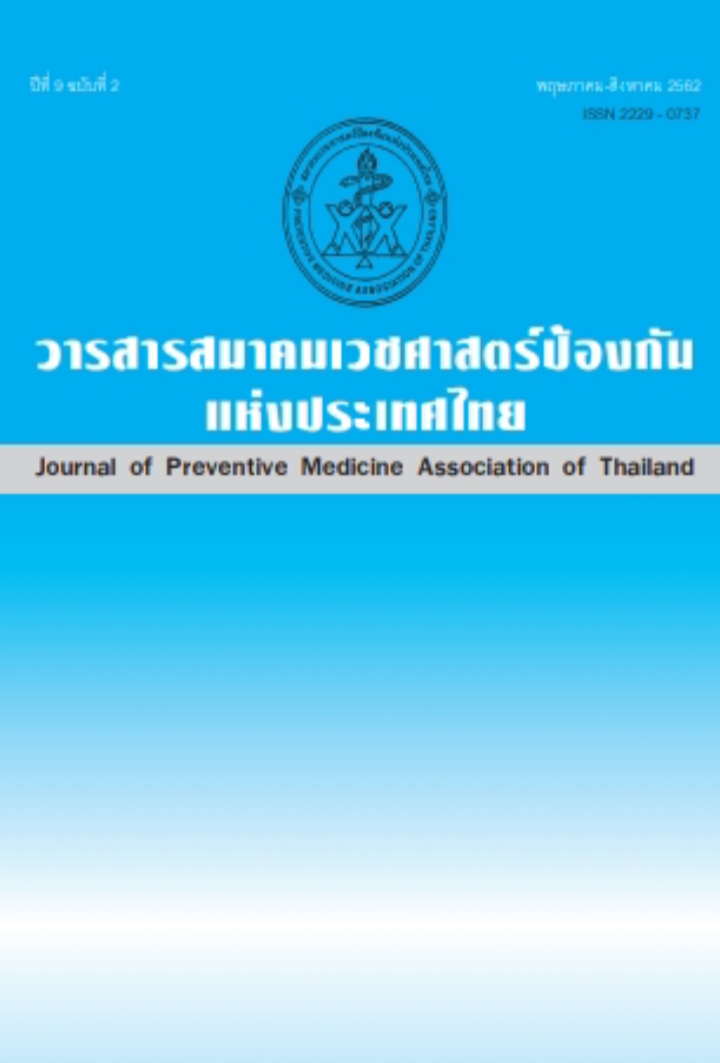The Effects of long Term Fasting in Ramadan on Glucose Regulation in Type 2 Diabetes Mellitus in Phra Nakhon Si Ayutthaya District, Phra Nakhon Si Ayutthaya Province.
Keywords:
Ramadan, fasting, type 2 diabetes mellitus, fasting plasma glucose, hypoglycemia, hyperglycemiaAbstract
In Ramadan, Muslims fast food and drink from sunrise to sunset that can affect glycemic control of people with diabetes. There are many Thai Muslims with diabetes in area of this study and poor glycemic control problem is common. This research aims to study the effects of Ramadan fasting on glucose regulation and complications of type 2 diabetic patients. Population of the study was patients who presented at non-communicable diseases clinic of Lumplee Health Promoting Hospital, Lumplee Sub-district, Phra Nakhon Si Ayutthaya District, Phra Nakhon Si Ayutthaya Province. Data of fasting plasma glucose, weight, height, hypoglycemic and hyperglycemic symptoms were collected on 2 weeks before and after Ramadan. The average fasting plasma glucose was 167.37±48.89 mg/dL before Ramadan and was 168.59±55.03 mg/dL after Ramadan. Paired t-test was used to compare the data and founded that there was no statistically significant difference between pre and post-Ramadan fasting plasma glucose. On the other hand, post-Ramadan weight was significantly lower than pre-Ramadan at the 0.05 level (p=0.013) with 0.48 kg average difference. And fasting duration was associated with hypoglycemic symptoms at the level of 0.05 (p=0.002), but not associated with hyperglycemic symptoms. In this study, Ramadan did not affect to glucose regulation, but the report of hypoglycemic symptoms was higher than average incident, which can be used for care and prevent the complications of patients in Ramadan.
References
2. สมาคมโรคเบาหวานแห่งประเทศไทย, ในพระราชูปถัมภ์สมเด็จพระเทพรัตนราชสุดาฯ สยามบรมราชกุมารี. หนังสือแนวทางเวชปฏิบัติสำหรับโรคเบาหวาน 2560 [อินเทอร์เน็ต]. ปทุมธานี: บริษัท ร่มเย็น มีเดีย จำกัด; 2560 [เข้าถึงเมื่อ 6 มิถุนายน 2561]. เข้าถึงได้จาก:https://www.thaiendocrine.org/th/2018/03/10/หนังสือแนวทางเวชปฏิบัติ-2/
3. อารี จำปากลาย, ธีรนงค์ สกุลศรี, อาซิส ประสิทธิหิมะ. มุสลิมในประเทศไทย: ชายขอบหรือเพียงแค่แตกต่าง? ประชากรชายขอบและความเป็นธรรมในสังคมไทย. [อินเทอร์เน็ต] [เข้าถึงเมื่อ 6 มิถุนายน 2561] เข้าถึงได้จาก: https://www2.ipsr.mahidol.ac.th/ConferenceVIII/Download/Article_Files/4-MuslimsThailand-Aree.pdf
4. Karatoprak C, Yolbas S, Cakirca M, Cinar A, Zorlu M, Kiskac M, et al. The effects of long term fasting in Ramadan on glucose regulation in type 2 Diabetes Mellitus. Eur Rev Med Pharmacol Sci 2013;17:2512-6.
5. Jabbar A, Hassanein M, Beshyah SA, Boye KS, Yu M, Babineaux SM. CREED study:Hypoglycaemia during Ramadan in individuals with Type 2 diabetes mellitus from three continents. Diabetes Res Clin Pract 2017;132:19-26.
6. จาตุรนต์ ตั้งสังวรธรรมะ, สายพิณ หัตถีรัตน์, วัจนา ลีละพัฒนะ. การปรับเปลี่ยนพฤติกรรมและการใช้ยาในช่วงเดือนถือศีลอดของผู้ป่วยมุสลิมที่เป็นโรคเบาหวานชนิดที่ 2. วารสารการแพทย์และวิทยาศาสตร์สุขภาพ (มหาวิทยาลัยศรีนครินทรวิโรฒ) 2553;17:70-86.
7. ซารินี มาซอ, พรทิพย์ มาลาธรรม, นุชนาฏ สุทธิ. การรับรู้ของผู้น?ำศาสนาอิสลามเกี่ยวกับพฤติกรรมการดูแลสุขภาพตามหลักปฏิบัติทางศาสนาของชาวไทยมุสลิมที่เป็นเบาหวานชนิดที่ 2 ระหว่างการถือศีลอดในเดือนรอมฎอน. รามาธิบดีพยาบาลสาร 2560;23:208-28.
8. Sahin S, Ayaz T, Ozyurt N, Ilkkilic K, Kirvar A, Sezgin H. The Impact of Fasting during Ramadan on the Glycemic Control of Patients with Type 2 Diabetes Mellitus. Exp Clin Endocrinol Diabetes 2013;121:531-4.
9. Alabbood MH, Ho KW, Simons MR. The effect of Ramadan fasting on glycaemic control in insulin dependent diabetic patients: A literature review. Diabetes Metab Syndr Clin Res Rev 2017;11:83-7.
10. Susilparat P, Pattaraarchachai J, Songchitsomboon S, Ongroongruang S. Effectiveness of contextual education for self-management in Thai Muslims with type 2 diabetes mellitus during Ramadan. J Med Assoc Thail Chotmaihet Thangphaet 2014;Suppl8:S41-49.
Downloads
Published
How to Cite
Issue
Section
License
บทความที่ลงพิมพ์ในวารสารเวชศาสตร์ป้องกันแห่งประเทศไทย ถือเป็นผลงานวิชาการ งานวิจัย วิเคราะห์ วิจารณ์ เป็นความเห็นส่วนตัวของผู้นิพนธ์ กองบรรณาธิการไม่จำเป็นต้องเห็นด้วยเสมอไปและผู้นิพนธ์จะต้องรับผิดชอบต่อบทความของตนเอง






